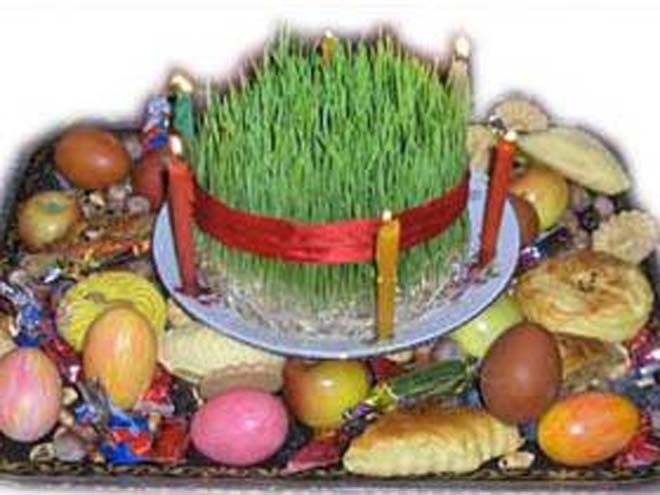Novruz is widely celebrated in our country as the symbol of winter's end and spring's beginning.
Novruz is celebrated on the first day of spring, which is determined by the annual circulation of the sun.
According to scientists, the holiday dates back to the period of the prophet Zardush, some 3,500-5,000 years ago.
This holiday was celebrated in ancient Babylon for 12 days beginning in Nisan (March, April). Each of the 12 days had its ceremonies and enjoyment. According to the first inscription, the holiday of Novruz was established in 505 B.C.
Islam figures always try to explain this holiday from a religions point of view. The prominent enlighteners Firdovsi, Rudaki, Avisenna, Nizami, Sadi, Hafiz and others have proven that Novruz is older.
Novruz was celebrated unofficially during Soviet times because it was prohibited. However, Azerbaijani families have followed the old tradition and have celebrated Novruz.
On Tuesdays we celebrate Su Charshanbasi (water Tuesday), Odlu Charshanba (fire Tuesday), Torpag Charshanbasi (land Tuesday) and Akhir Charshanba (final or wind Tuesday).
Based on folk tales, water in the first Tuesday purifies and stirs, fire in the second Tuesday, land on the third Tuesday and wind in the fourth Tuesday revives nature and trees begin to blossom, which symbolize spring.
The Noruz holiday is rich with ancient traditions and games. Khidir Ilyas is the symbol of productivity and Kos-Kosa shows that spring is coming.
Novruz also has interesting traditions related to water and fire. Being the land of the fire, Azerbaijan has rich traditions. Fire is the symbol of purification and clarification. Both men and women jump seven times over a fire and say, "'Give me your redness and take my yellowness." The fire is never put out with water but it is left to burn out. Young boys and girls take ashes from the fire and throw it far from their houses, which symbolizes throwing away of all of the family's mischance.
Traditions related to water symbolize the New Year in Azerbaijan. Jumping over flowing water one cleanses oneself from one's mistakes. Family members splash water on themselves before going to bed on New Year's Eve. They say all flowing waters cease in and everything bound to it, even trees bound down. Whoever drinks water from Akhir Charshanba New Year's Eve is considered to be protected from disease for the next year.
The peak of Novruz is the time when the past year gives its turn to new one. According to old traditions, pistols are fired in honor of Novruz. N. Dubrovin wrote in the 19th century: "Shootings in the cities and the villages informed people that spring is coming to Azerbaijan." Adam Oleary, witness of the Novruz holiday in 1637, wrote: "The astrologer very often stood up his place and determined the height of the sun with astronomic equipment and a sun clock and at the moment of equinox said that the New Year has come and music was heard ringing out from the towers and walls of the city."
Azerbaijanis pay particular attention to the table laid for the holiday. There should be seven different types of food on the table, all starting with "S." For example, sumakh (a kind of spice), sirke (vinegar), sud (milk), samani (grown wheat), sebzi (fried meat with greens) etc. A mirror adorned with colored eggs and candles should also be on the table. Candle is the symbol of fire and light (keeping a person from damage) and mirror is the symbol of happiness.
According to tradition, all family members should be at home on the first day of the holiday. People say: "If you are not at home on the day of the holiday, you will live without home for seven years."
On the first day of the New Year lights in the house are kept on for the whole night because no light and fire is the symbol of misfortune.
With Novruz people in the villages determine the coming year; whether it will be a dry, rainy and fertile year. According to tradition, the first day of Novruz symbolizes spring, the second day summer, the third day autumn and the fourth winter. If the first day is dry and with no wind spring is going to be good for agricultural work and if it is rainy and windy so the spring is expected to be the same. The rest of the days determine the summer, autumn and winter.
Novruz is a joyful and lovely holiday.






